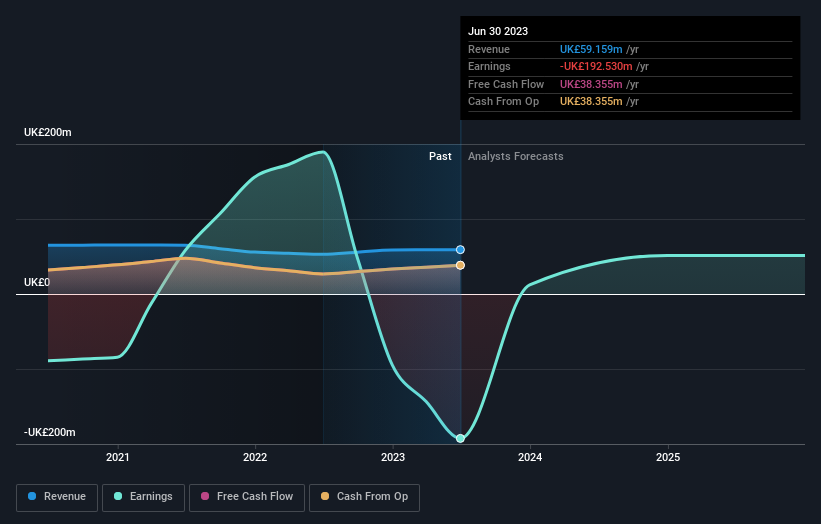Stock Analysis
- United Kingdom
- /
- REITS
- /
- LSE:BCPT
Balanced Commercial Property Trust (LON:BCPT) adds UK£42m to market cap in the past 7 days, though investors from five years ago are still down 9.7%

While not a mind-blowing move, it is good to see that the Balanced Commercial Property Trust Ltd (LON:BCPT) share price has gained 12% in the last three months. But over the last half decade, the stock has not performed well. You would have done a lot better buying an index fund, since the stock has dropped 30% in that half decade.
The recent uptick of 7.8% could be a positive sign of things to come, so let's take a look at historical fundamentals.
View our latest analysis for Balanced Commercial Property Trust
To quote Buffett, 'Ships will sail around the world but the Flat Earth Society will flourish. There will continue to be wide discrepancies between price and value in the marketplace...' One way to examine how market sentiment has changed over time is to look at the interaction between a company's share price and its earnings per share (EPS).
Balanced Commercial Property Trust became profitable within the last five years. On the other hand, it reported a trailing twelve months loss, suggesting it isn't reliably profitable. Other metrics may better explain the share price move.
The most recent dividend was actually lower than it was in the past, so that may have sent the share price lower. On top of that, revenue has declined by 3.3% per year over the half decade; that could be a red flag for some investors.
The image below shows how earnings and revenue have tracked over time (if you click on the image you can see greater detail).

This free interactive report on Balanced Commercial Property Trust's balance sheet strength is a great place to start, if you want to investigate the stock further.
What About Dividends?
As well as measuring the share price return, investors should also consider the total shareholder return (TSR). The TSR incorporates the value of any spin-offs or discounted capital raisings, along with any dividends, based on the assumption that the dividends are reinvested. So for companies that pay a generous dividend, the TSR is often a lot higher than the share price return. In the case of Balanced Commercial Property Trust, it has a TSR of -9.7% for the last 5 years. That exceeds its share price return that we previously mentioned. This is largely a result of its dividend payments!
A Different Perspective
We're pleased to report that Balanced Commercial Property Trust shareholders have received a total shareholder return of 13% over one year. Of course, that includes the dividend. There's no doubt those recent returns are much better than the TSR loss of 1.9% per year over five years. This makes us a little wary, but the business might have turned around its fortunes. I find it very interesting to look at share price over the long term as a proxy for business performance. But to truly gain insight, we need to consider other information, too. For instance, we've identified 1 warning sign for Balanced Commercial Property Trust that you should be aware of.
We will like Balanced Commercial Property Trust better if we see some big insider buys. While we wait, check out this free list of growing companies with considerable, recent, insider buying.
Please note, the market returns quoted in this article reflect the market weighted average returns of stocks that currently trade on British exchanges.
Valuation is complex, but we're helping make it simple.
Find out whether Balanced Commercial Property Trust is potentially over or undervalued by checking out our comprehensive analysis, which includes fair value estimates, risks and warnings, dividends, insider transactions and financial health.
View the Free AnalysisHave feedback on this article? Concerned about the content? Get in touch with us directly. Alternatively, email editorial-team (at) simplywallst.com.
This article by Simply Wall St is general in nature. We provide commentary based on historical data and analyst forecasts only using an unbiased methodology and our articles are not intended to be financial advice. It does not constitute a recommendation to buy or sell any stock, and does not take account of your objectives, or your financial situation. We aim to bring you long-term focused analysis driven by fundamental data. Note that our analysis may not factor in the latest price-sensitive company announcements or qualitative material. Simply Wall St has no position in any stocks mentioned.
About LSE:BCPT
Balanced Commercial Property Trust
The trust is a vehicle for investors who wish to gain exposure to prime UK commercial property.
Average dividend payer with moderate growth potential.

